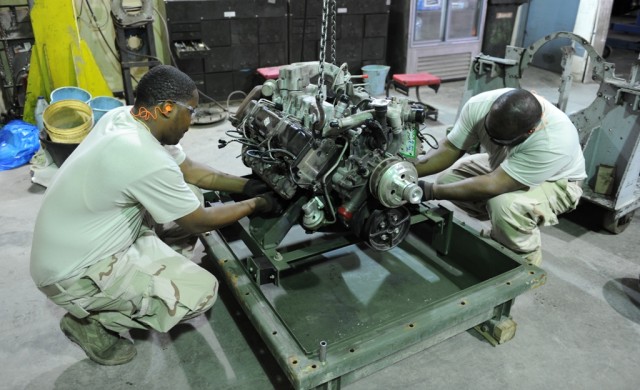ANNISTON ARMY DEPOT, Ala. - Members of the TACOM Life Cycle Management Command family have a reputation of responding to the call to duty in support of America's Armed Forces at its Forward Repair Activity in Kuwait. Volunteers from Anniston Army Depot's skilled workforce are a part of the picture.
Over the years, the assignments have changed, but the vitality of the volunteers who deploy on a revolving basis remains strong.
Today, the FRA is comprised of approximately 50 employees from Anniston and Red River Army depots. Very similar to the Nichols Industrial Complex at Anniston, the facility includes a disassembly bay, cleaning area, machine shop and dynamometer testing area. Adjacent to it is a mobile parts hospital.
"We're a small piece of the overall equation, but we are very proud of the work we do here," said Gary Higgins, FRA division chief. "Whether from Anniston or Red River, the difference is indiscernible. Wearing government-issued clothing, the employees unite to accomplish the mission. From engine overhaul to transmission repairs, the team works side-by-side incorporating an accident-free environment while showing concern for each other."
The mission extends from remanufacturing equipment inside the warehouse-styled facility to manufacturing parts in the Mobile Parts Hospitals.
During Higgins' tenure, there has only been one reported accident. And, the team has implemented ways to work more efficiently.
"We did some rearranging to move disassembly closer to the cleaning area. Even here, we are leaning our processes." This step has improved monthly production time on several vehicles, to include the Heavy Equipment Transporter, or HET, and the Armored Security Vehicle, or ASV.
Welder and machinist supervisor Ted Ervin said that involving the employees in the decision making and capitalizing on their strengths has added value.
"We spend time in the work areas with the employees and access their capabilities. We want them to work safely and smarter while meeting production. If employees are comfortable performing their jobs, they will work safely," said Ervin.
Red River Army Depot supervisor Robert Dean has been a member of the travel team for months and lives by this motto: "We are here to support the Soldiers, and we work daily to meet that goal."
Regardless of their home duty station, employees elected to become part of the team for various reasons.
Anniston's heavy mobile equipment mechanic Darryl Adams has volunteered on several missions, to include stops in Texas, Colorado and Germany. He loves traveling and the opportunity to grow personally and professionally. "I have learned a lot of different machining techniques while working here," he said. "And at the end each day, it makes me feel good knowing that my work directly impacts our troops."
"I have a son in the Air Force," said Anniston Defense Generator and Rail Equipment Center electrician Roger Harris. "His unit will be deploying soon. While in a civilian capacity, this is the closest I can get to experiencing what he might endure."
For depot machinist Kirt Coppock, it was his first time on an airplane. "I've never been away from my wife for longer than two days during our 26 years of marriage, but I am so glad I am here to see the value of my work."
Horace Mangham, a depot mechanic, expressed how his opinion changed after learning firsthand from a Soldier how much he (the Soldier) appreciated the efforts of the civilian volunteers. "Our shift ends after 12 hours each day, but the Soldiers are here for a much longer duration and just hearing him say that we were making a difference made a huge impression." Mangham performs tedious work daily using a vertical honing machine. It is used for boring and honing blocks for engines.
Machinist Drew Bittle deployed for an added sense of pride. "I only possess a civilian background and being accepted here in a true military environment makes me feel like I'm contributing to the success of our nation," he said. Back at Anniston, Bittle works in the Powertrain Flexible Maintenance Facility.
While the temperatures are heating up in Kuwait, so are the assignments. The FRA will soon inherit a battery program for all combat vehicles. The FRA team will segregate the batteries and prepare them for reclaim or recycling.
Our success will be attributable to the teaming of this highly skilled group of volunteers said Higgins. "We receive strength from the support of our fellow employees back home and our immediate families. We hope to see a better and safer world for generations to come by giving our best now."
The Forward Repair Activity was constructed in 2002. A team of experts from Anniston and Tobyhanna Army depots, to include Mike Cannon, chief of the Directorate of Production's Manufacturing Division, was instrumental in the establishment.
They started with an empty hull, a structure that was without lights and electricity and gradually converted it into a facility that was eventually designed to rebuild engines and their components, to include fabrication and welding. It was a slow process, but with the assistance of many dedicated employees, they were able to meet the needs of the Soldiers.










Social Sharing